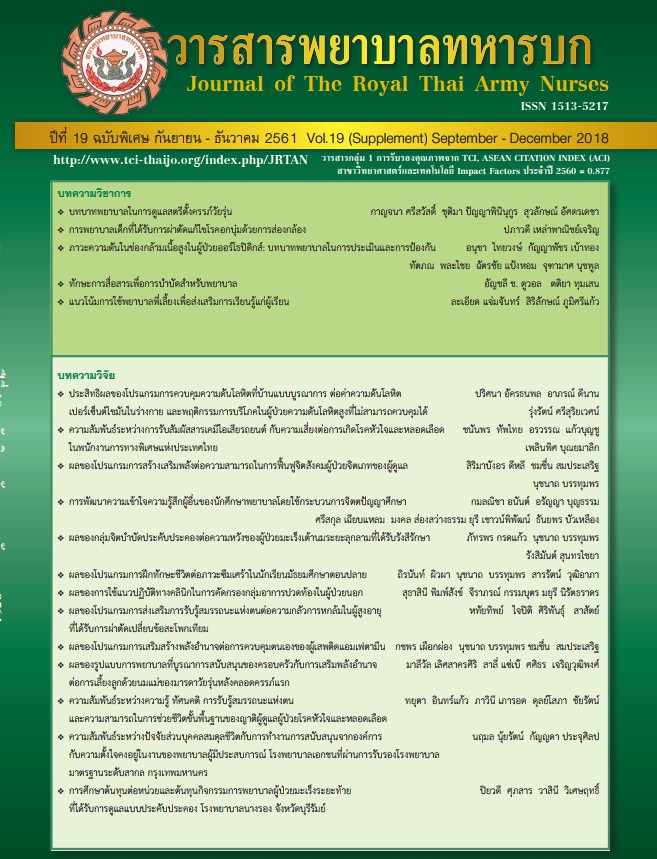The Effects of An Empowerment Program on The Self-Control of Amphetamine Use Disorder Patients
Keywords:
empowerment program, self-control, amphetamine use disorder patieAbstract
The purpose of this quasi-experimental study was to examine the effects of an empowerment program on amphetamine use disorder patients. The sample consisted of 60 males aged between 20-59 years in the Princess Mother National Institute for Drug Abuse Treatment (PMNIDAT) in Thailand. They were randomly assigned to either the experimental or control group (n = 30 in each group). The experimental group received the empowerment program for 5 weeks, 90-120 minutes per session, twice a week consecutively. The participants in the control group received routine care from the ward. Personal information forms were used to collect the data. The participants’ self-control scores were measured using a self-control schedule developed from Rosenbaum’s self-control schedule before and after the empowerment program. Descriptive statistics were used to represent the personal information about the participants; a dependent t-test was used to compare the mean of the self-control scores before and after the intervention in with each group; and an independent t-test was used to examine the mean differences in the self-control scores between the experimental and control groups. The study found that 1) after receiving the empowerment program, there was a significant increase in the mean of the self-control scores (M = 169.40, SD = 18.16) (t = 8.18, p<.001) and 2) there was a significant difference in the mean differences in the self-control scores in the experimental group ( = 10.33, SD = 6.92) and control group ( = 1.83, SD = 7.43) between the pretest and posttest interventions for both groups (t = 4.58, p<.001). The findings suggest the beneficial effects of such an empowerment program in increasing the self-control of amphetamine use disorder patients in terms of rehabilitation.
References
2. White, FJ., & Kalivas, PW. Neuroadaptations involved in amphetamine and cocaine addiction. Drug Alcohol Dependence. 1998; 51(1-2) : 141-153.
3. Pipat, P., Rangsiman, S., & Sararud, V. The effects of a cognitive behavior therapy program on the aggressive behaviors among patients with amphetamine dependence. Journal of The Royal Thai Army Nurses. 2017; 18 (Supplement) : 207-214. (in thai).
4. Wongpanarak, N. & Chaleoykitti, S. The Role of the Nurse in Addiction Counseling. Journal of The Royal Thai Army Nurses. 2018; 19(1) : 16-23. (in thai).
5. Hall, W., Hando, J., Darke, S., & Ross, J. Psychological morbidity and route of administration among amphetamine users in Sydney. Australia. Addiction. 1996; 91(1) : 81-87.
6. Ciccarone,D. Stimulant abuse: Pharmacology, cocaine, methamphetamine, treatment, attempts at pharmacotherapy. Primary Care. 2011; 38(1) : 41-58.
7. Nanta, C. Model development for rehabilitation in methamphetamine abuser: A participatory action research. The degree of doctor (philosophy community and family medicine). Thammasat university. 2015. (in thai).
8. Sumnao, N., Boonrueng, S., & Usa, K. Causal relationship of factors affect relapsing behavior of methamphetamine users. Journal of graduate studies. Valaya alongkorn rajabhat university. 2016; 10(1) : 193-207. (in thai).
9. Wills, Thomas.,G Ainette, Michael., Stoolmiller, Mike.,X Gibbons, Frederick. & Shinar, Ori. Psychology of addictive behaviors: Good self-control as a buffering agent for adolescent substance use: An investigation in early adolescence with time-varying covariates. Journal of the Society of Psychologists in Addictive Behaviors. 2009; 22(4) : 459-471.
10. Denis, R. & Manuel, E. The ‘drug–crime link’ from a self-control perspective. European journal of Criminology. 2006; 3(1) : 33-67.
11. Rosenbaum, M. A schedule for assessing self-control behavior: Preliminary findings. behavior therapy. 1980; 11(1) : 109-121.
12. Gibson,C.H. The process of empowerment in mothers of chronically ill children. Journal of Advance Nursing. 1995; 21(6) ; 1201-1210.
13. Jantira, M., Nidtaya, T. & Sararud, V. The effects of a cognitive-behavioral therapy program on the depression and impulsivity among adolescents in juvenile training centers in bangkok and Vicinity Areas. Journal of Nursing and health care. 2018; 36(1) : 154-163. (in thai).
14. Sujitta, R., & Kritaya, S. Violent behavior toward family of methamphetamine users. Journal of Nursing Science & Health. 2011; 34(3) : 48-56. (in thai).
15. Rosenbaum, M. Learned resourcefulness. Springer series on behavior therapy and behavioral medicine. Springer Publishing. 1990; 24.
16. World Health Organization. Global status report on alcohol 2014. Department of Mental Health and Substance Abuse. Geneva. 2014.
17. Poomsanguan, K. Health Empowerment: Nurses’ Important Role. Journal of The Royal Thai Army Nurses. 2014; 15(3) : 86-90. (in thai).
Downloads
Published
How to Cite
Issue
Section
License
บทความหรือข้อคิดเห็นใดใดที่ปรากฏในวารสารพยาบาลทหารบกเป็นวรรณกรรมของผู้เขียน ซึ่งบรรณาธิการหรือสมาคมพยาบาลทหารบก ไม่จำเป็นต้องเห็นด้วย
บทความที่ได้รับการตีพิมพ์เป็นลิขสิทธิ์ของวารสารพยาบาลทหารบก
The ideas and opinions expressed in the Journal of The Royal Thai Army Nurses are those of the authors and not necessarily those
of the editor or Royal Thai Army Nurses Association.





